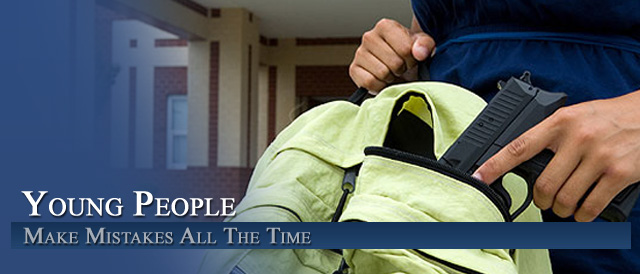
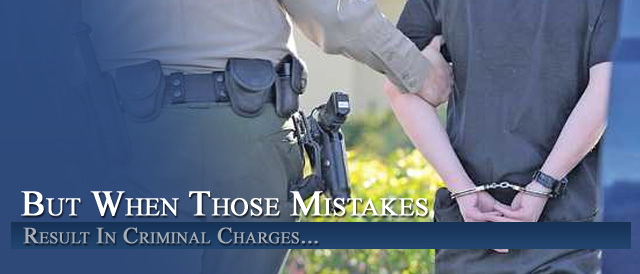
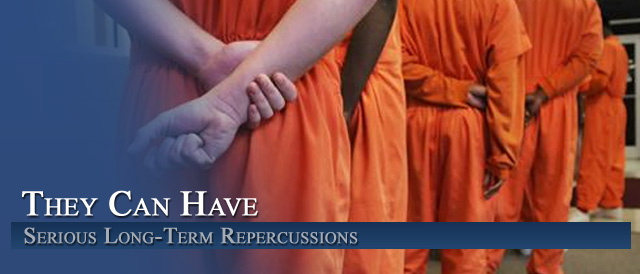
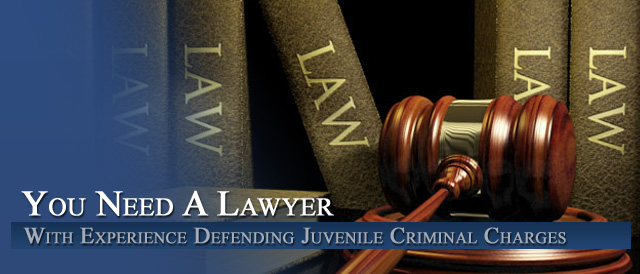
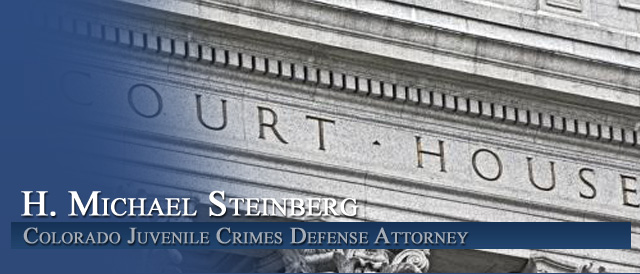
After Your Child Is Arrested in Colorado – Juvenile Criminal Screening And The Detention Hearing Part II Of II
By H. Michael Steinberg – Colorado Criminal Juvenile Defense Lawyer – Attorney
After Your Child Is Arrested in Colorado – Juvenile Criminal Screening And The Detention Hearing – Following your child’s arrest in Colorado – if they are not released immediately back to you – (as the parent – or the guardian of the child) – and are instead held in custody, then following the “screening of your child’s case” there is an open court hearing called a “detention hearing.”
Detention is defined as the incarceration of your child in secure custody such as a jail or other physically restricting facilities. It is the same as placing your child in jail. Detention is a misnomer – it is incarceration by another name.
The Purposes Of The Juvenile Code Play A Key Role In The Decision Of Whether To Coninue To Incarcerate A Juvenile
These puposes are:
1. To secure for each child subject to these provisions such care and guidance, preferably in his or her own home, as will best serve his welfare and the interests of society;
2. To preserve and strengthen family ties whenever possible, including improvement of home environment;
3. To remove a child from the custody of his or her parents only when his welfare and safety or the protection of the public would otherwise be endangered and, in either instance, for the courts to proceed with all possible speed to a legal determination that will best serve the best interests of the child; and
4. To secure for any child removed from the custody of his or her parents the necessary care, guidance, and discipline to assist him or her in becoming a responsible and productive member of society.
What Are Some Examples Of The Alternatives To Pre-Trial Detention In Colorado?
There are several alternatives to “lock up” as a method of “pre-trial control.” Often these methods are used in conjunction with one another. Options may include home confinement, electronic monitoring, home reporting centers, and certain non-secure facilities.
Home confinement – (home arrest)
Home confinement -(home arrest) – The juvenile must remain at his or her own residence, with the exception of an approved leave. Approved leave usually includes attending school or work, religious services, and court-ordered treatment or monitoring, or medical services. This kind of “confinement” is the most minimally invasive of the juvenile’s life during the pre-trial proceedings. Home confinement is usually monitored by a probation officer who confirms the juvenile is where he supposed to be when he or she is supposed to be there using random check ins. Finally it is not unusual for the court to also order the use of electronic monitoring ( an ankle bracelet) to assist the probation officer to ensure compliance.
Electronic monitoring
Electronic monitoring involves the use of a device that can verify that offenders where they are supposed to be and -as noted – is usually combined with home arrest. The device can be either active or passive, but both require the offender to have a home telephone landline.
Global Positioning Systems (GPS)
GPS systems also track offenders, from one “zone” to the next. While more expensive – they are much more reliable than the ankle bracelet.
Home Confinement and Reporting Requirements
Here – there is no ankle monitor or GPS – and the reporting requirement is based on home visits and/or call ins.
After Your Child Is Arrested in Colorado – Juvenile Criminal Screening And The Detention Hearing – The “Least Restrictive Alternative”
Colorado juvenile court judges are under a mandate to impose the least restrictive form of release. The word “detain” refers to any time an individual is not free to leave, and in Colorado juvenile systems, this may occur for various reasons and at various stages of cases.
Why Having A Colorado Juvenile Criminal Defense Lawyer At The Detention Hearing Is Critical
First – when your child’s freedom is at stake – every Colorado criminal defense lawyer knows they must vigorously advocate the client’s release at this initial detention hearing. The detention hearing calls upon all of the Colorado juvenile criminal defense lawyer’s skills, experience and talents. At this hearing – the accused juvenile’s family and the alleged victim are likely to be present anxious and emotional.
To Fight For Your Child’s Freedom
The job of the criminal defense lawyer is to fight for the least restrictive form of release for the accused juvenile pending the final outcome of the case. The truth is only poorly written and incomplete police reports and ambiguous fact sheets are available to the defense so early in the process. That leads to prosecutors and / or probation officers speculating on what happened and offering unverified evidence to the court.
The Colorado Juvenile Detention Hearing – Trial Under Fire
Pre-hearing negotiations require the lawyer to seize upon the juvenile’s background and successes to counter the rampant speculation about the juvenile’s alleged role in the crimes charge. The lawyer must have the ability to think on his or her feet and seize upon facts and circumstances learned only moments earlier.
The law is laid out below. The lawyer must compel the Judge to hold carefully to the statutory rights and legal standards in the law while also using persuasion to move the Judge to take the risk of allowing for the alternatives to incarceration during the progress of the case through the courts. An experienced Colorado Juvenile Defense lawyer has a duty to not only intellectually explore these alternatives – the lawyer must fight for “the least restrictive form of release” for a his young client. It is tougher than you think.
A Summary Of Custody and Detention In Colorado
When a juvenile is taken into temporary custody by a police officer or other law enforcement officer there are only two ways for them to make the arrest. Either (1) they are executing a lawful arrest warrant or (2) they have “reasonable grounds” to believe that the juvenile has committed a delinquent act. Notably – a probation officer also has the right to take a child into custody if the there has been an alleged violation of probation.
The Police Have A Choice – To Arrest Or Immediately Release A Child To The Parents Or Guardian
The police in all but domestic violence cases – can decide NOT to take a child into custody. They can permit the child and the guardian to sign a written promise to appear in court on a specified charge – as they do in almost all misdemeanor, petty offense and traffic matters – to later appear on a particular date and time…. no arrest.
In fact the law urges the immediate release of juveniles to their parents or other responsible adult. This is supposed to happen unless the police officer determines that the “juvenile’s immediate welfare or the protection of the community requires that the child be detained.” That is a very vague standard and is difficult for the police and the court’s to interpret such as it is.
Unless the danger to himself or other standard applies – the police are only authorized to hold a child in custody as long as reasonably necessary to obtain basic identification information and to contact his or her parents.
If Your Child Is Arrested
If release does not happen and your child is arrested they must be taken to a court, a place of detention, a temporary holding facility, or a shelter without delay.
At that point the juvenile is “screened” by the “screening team” The screening team then notifies the notifies the juvenile’s parent/guardian of the arrest and informs them of the right to a detention hearing to address continued custody.
A “screening team” under Colorado law – is a person or persons – employed by the courts – to assist the judge in determining whether a juvenile in custody should be released and under what conditions. To do this – they use certain screening “tools” such as the Juvenile Detention Screening and Assessment Guide (JDSAG).
For minor crimes a JDSAG may not be administered if it appears that the juvenile will be relesed without the need for a lengthy detention hearing.
The Timing Of The Colorado Detention Hearing
If the police create the “hold” situation – the detention hearing must be held and the “screening team” must do their “intake” within 48 hours of the arrest (excluding weekends and holidays) to make the determination as to whether or not continued detention is warranted. The 48 hour time frame can be extended for good cause.
Process At The Colorado Detention Hearing
A detention hearing has one purpose .. the continued detention of the juvenile or his or her release or “placement” and the conditions of that placement if any. The judge is allowed to consider ALL information from any source if it has “probative value.”, The judge can only order continued detention under very narrow circumstances.. The judge must find that the “the juvenile is a danger to himself or herself or to the community.”
Certain Criminal Charges Create A Rebuttable Presumption That The Juvenile Stay In Custody
While it may seem overly legal “a rebuttable presumption of danger” occurs, for example, when a juvenile is alleged to have committed a crime of violence or one of several statutorily defined weapons offenses under Colorado Law (see below)
A rebuttable presumption does not shift the burden from the prosecutor to the defense. Under Colorado law – it means that the defense lawyer can present evidence to refute – to challenge the presumption. At that point – the DA – prosecutor must prove the evidenciary basis for the presumption (such as dangerousness).
The judge – after hearing the evidence and arguments of the parties decides whether to release to the custody of a parent with or without bail, whether to place the child in a shelter facility, in a pre-adjudication program, or to continue to detain the child without bail.
If the judge orders the child to remain in jail (detention) the judge has to justify that decision with very specific ” findings” which include addressing why the out-of home-placement is necessary and in the juvenile’s and the community’s best interest.
Here Is An Analysis Of The ACTUAL LAW On Colorado Detention Hearings – 19-2-508
Colorado Section 19-2-508 – Governs Colorado Juvenile Detention Hearings
The following excerpts from statute are analyzed for the reader section by section (The sections of this statute addressed to the direct filing and transfer of juveniles to adult court as well as the sections addressing to juveniles with mental health related issues sections are excluded and are addressed elsewhere on my website).
19-2-508. Detention and shelter – hearing – time limits – findings – review – confinement with adult offenders – restrictions.
[HMS – This section (1) mandates that if a child must be removed from their home – if there is no legal reason to incarcerate them – they must be placed into a shelter facility.]
(1) A juvenile who must be taken from his or her home but who does not require physical restriction shall be given temporary care in a shelter facility designated by the court or the county department of social services and shall not be placed in detention.
[HMS – Section (2) initiates the screening process – notification to the parents and or guardians of the child and creates the right to an immediate detention hearing.]
(2) When a juvenile is placed in a detention facility, in a temporary holding facility, or in a shelter facility designated by the court, the screening team shall promptly so notify the court. The screening team shall also notify a parent or legal guardian or, if a parent or legal guardian cannot be located within the county, the person with whom the juvenile has been residing and inform him or her of the right to a prompt hearing to determine whether the juvenile is to be detained further. The court shall hold such detention hearing within forty-eight hours, excluding Saturdays, Sundays, and legal holidays.
[HMS – Section (3) creates the right to a hearing within 48 hours unless there is good cause to continue the hearing past that deadline.]
(3) (a) (I) A juvenile taken into custody pursuant to this article and placed in a detention or shelter facility or a temporary holding facility shall be entitled to a hearing within forty-eight hours, excluding Saturdays, Sundays, and legal holidays, of such placement to determine if he or she should be detained. The time in which the hearing shall be held may be extended for a reasonable time by order of the court upon good cause shown.
[HMS Section (3)(a)(II) sets the standard for release as a finding by the judge that the juvenile is a juvenile is a danger to himself or herself or to the community.”
(II) The primary purpose of a detention hearing shall be to determine if a juvenile should be detained further and to define conditions under which he or she may be released, if his or her release is appropriate. A detention hearing shall not be considered a preliminary hearing.
(III) With respect to this section, the court may further detain the juvenile if the court is satisfied from the information provided at the hearing that the juvenile is a danger to himself or herself or to the community.
[HMS – All information is admissible at the detention hearing if it is probative (helpful).]
Any information having probative value shall be received regardless of its admissibility under the rules of evidence. In determining whether a juvenile requires detention, the court shall consider any record of any prior adjudications of the juvenile.
[HMS – the remainder of this section creates a rebuttable presumption that the standard -danger to himself or others – if certain crimes are involved.]
There shall be a rebuttable presumption that a juvenile is a danger to himself or herself or to the community if:
(A) The juvenile is alleged to have committed a felony enumerated as a crime of violence pursuant to section 18-1.3-406, C.R.S.; or
(B) The juvenile is alleged to have used, or possessed and threatened to use, a firearm during the commission of any felony offense against a person, as such offenses are described in article 3 of title 18, C.R.S.; or
(C) The juvenile is alleged to have committed possessing a dangerous or illegal weapon, as described in section 18-12-102, C.R.S.; possession of a defaced firearm, as described in section 18-12-103, C.R.S.; unlawfully carrying a concealed weapon, as described in section 18-12-105, C.R.S.; unlawfully carrying a concealed weapon on school, college, or university grounds, as described in section 18-12-105.5, C.R.S.; prohibited use of weapons, as described in section 18-12-106, C.R.S.; illegal discharge of a firearm, as described in section 18-12-107.5, C.R.S.; or illegal possession of a handgun by a juvenile, as described in section 18-12-108.5, C.R.S.
(III.5) Notwithstanding the provisions of subparagraph (III) of this paragraph (a), there shall be no presumption under sub-subparagraph (C) of subparagraph (III) of this paragraph (a) that a juvenile is a danger to himself or herself or the community if the item in the possession of the juvenile is alleged to be a BB gun, a pellet gun, or a gas gun.
[HMS – Section IV sets out the judge’s choices after all arguments and evidence is in as to what orders to enter – what choices the judge has as to the placement of the juvenile.]
(IV) At the conclusion of the hearing, the court shall enter one of the following orders:
(A) That the juvenile be released to the custody of a parent, guardian, or legal custodian without the posting of bond;
(B) That the juvenile be placed in a shelter facility;
(C) That bail be set and that the juvenile be released upon the posting of that bail;
(D) That no bail be set and that the juvenile be detained without bail upon a finding that such juvenile is a danger to himself or herself or to the community. Any juvenile who is detained without bail must be tried on the charges in the petition filed pursuant to subparagraph (V) of this paragraph (a) within the time limits set forth in section 19-2-108, unless the juvenile is deemed to have waived the time limit for an adjudicatory trial pursuant to section 19-2-107 (4).
(E) That no bail be set and that, upon the court’s finding that the juvenile is a danger to himself or herself or to the community, the juvenile be placed in a preadjudication service program established pursuant to section 19-2-302. This sub-subparagraph (E) shall not apply to any case in which the juvenile’s alleged offense is one of the offenses described in subparagraph (III) of this paragraph (a).
[HMS – IF the juvenile is held in custody – the District Attorney MUST file charges within 72 hours of the judge’s findings.]
(V) When the court orders further detention of the juvenile or placement of the juvenile in a preadjudication service program after a detention hearing, the district attorney shall file a petition alleging the juvenile to be a delinquent within seventy-two hours after the detention hearing, excluding Saturdays, Sundays, and legal holidays. The juvenile shall be held or shall participate in a preadjudication service program pending a hearing on the petition. Upon a showing of good cause, the court may extend such time for the filing of charges.
(VI) Following the detention hearing, if the court orders that the juvenile be released and, as a condition of such release, requires the juvenile to attend school, the court shall notify the school district in which the juvenile is enrolled of such requirement.
[HMS – Finally- Section (VII) requires the judge to make specific findings to justify the continued incarceration of the juvenile.]
(VII) If the court orders further detention of a juvenile pursuant to the provisions of this section, said order shall contain specific findings as follows:
(A) Whether placement of the juvenile out of his or her home would be in the juvenile’s and the community’s best interests;
(B) Whether reasonable efforts have been made to prevent or eliminate the need for removal of the juvenile from the home, whether it is reasonable that such efforts not be provided due to the existence of an emergency situation that requires the immediate removal of the juvenile from the home, or whether such efforts not be required due to the circumstances described in section 19-1-115 (7);
and
(C) Whether procedural safeguards to preserve parental rights have been applied in connection with the removal of the juvenile from the home, any change in the juvenile’s placement in a community placement, or any determination affecting parental visitation of the juvenile.
…
[HMS – This section gives the police authority to require the continued detention of a child and a detention hearing when the law enforcement agency believes that the “the juvenile’s immediate welfare or the protection of the community requires that the juvenile be detained.”
(c) (I) A juvenile taken to a detention or shelter facility or a temporary holding facility pursuant to section 19-2-502 as the result of an allegedly delinquent act that constitutes any of the offenses described in subparagraph (III) of paragraph (a) of this subsection (3) shall not be released from such facility if a law enforcement agency has requested that a detention hearing be held to determine whether the juvenile’s immediate welfare or the protection of the community requires that the juvenile be detained. A juvenile shall not thereafter be released from detention except after a hearing, reasonable advance notice of which has been given to the district attorney, alleging new circumstances concerning the further detention of the juvenile.
…
[HMS – this final section I have included section prohibits the use of detention in a jail sentencing if the hold is based on a “status crime” such as truancy or runaway status.]
(8) (a) A juvenile who allegedly commits a status offense or is convicted of a status offense shall not be held in a secure area of a jail or lockup.
(b) A sheriff or police chief who violates the provisions of paragraph (a) of this subsection (8) may be subject to a civil fine of no more than one thousand dollars. The decision to fine shall be based on prior violations of the provisions of paragraph (a) of this subsection (8) by the sheriff or police chief and the willingness of the sheriff or police chief to address the violations in order to comply with paragraph (a) of this subsection (8).
After Your Child Is Arrested in Colorado – Juvenile Criminal Screening And The Detention Hearing
ABOUT THE AUTHOR: H. Michael Steinberg – Email The Author at: hmichaelsteinberg@colorado-juvenile-crimes-lawyer or call his office at 303-627-7777 during business hours – or call his cell if you cannot wait and need his immediate assistance – 720-220-7777.
If you are charged with A Colorado crime or you have questions about the topic of this article “After Your Child Is Arrested in Colorado – Juvenile Criminal Screening And The Detention Hearing”, please call our office. The Law Offices of H. Michael Steinberg, in Denver, Colorado, provide criminal defense clients with effective, efficient, intelligent and strong legal advocacy. We can educate you and help you navigate the stressful and complex legal process related to your criminal defense issue.
H. Michael Steinberg, is a Denver, Colorado criminal defense lawyer with over 40 years of day to day courtroom experience – specializing in Colorado Criminal Law along the Front Range. He will provide you with a free initial case consultation to evaluate your legal issues and to answer your questions with an honest assessment of your options. Remember, it costs NOTHING to discuss your case. Call now for an immediate free phone consultation.
Helping Clients To Make Informed Decisions In the Defense of Colorado Criminal Cases.
Contact A Lawyer with Three Decades of Experience as a Denver Criminal Attorney at The Steinberg Colorado Criminal Defense Law Firm Today.
Colorado Defense Lawyer H. Michael Steinberg provides solid criminal defense for clients throughout the Front Range of Colorado – including the City and County courts of Adams County, Arapahoe County, City and County of Boulder, City and County of Broomfield, City and County of Denver, Douglas County, El Paso County – Colorado Springs, Gilpin County, Jefferson County, Larimer County, and Weld County,…. and all the other cities and counties of Colorado along the I-25 Corridor… on cases involving the topic of this article …After Your Child Is Arrested in Colorado – Juvenile Criminal Screening And The Detention Hearing.
Other Articles of Interest:
- The Temporary Holding Facility C.R.S. 19-2-507(1)
- The Arrest of Juveniles In Colorado – Colorado Criminal Juvenile Law Part I of II
- Understanding The Colorado Juvenile Pretrial System Part II of II
- If Your Child Is Arrested In A Colorado Juvenile Criminal Case – Some Tips For Parents From A Colorado Juvenile Criminal Defense Lawyer
- After Your Child Is Arrested in Colorado – Juvenile Criminal Screening And The Detention Hearing Part I Of II













